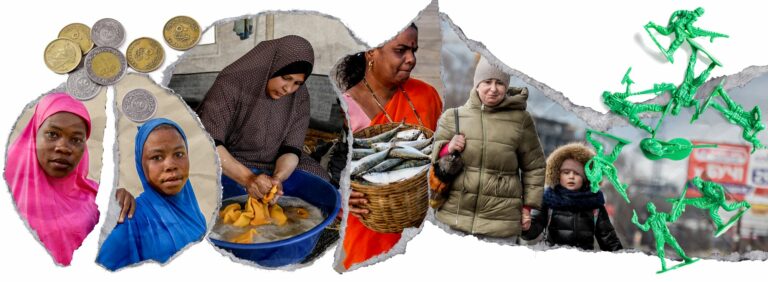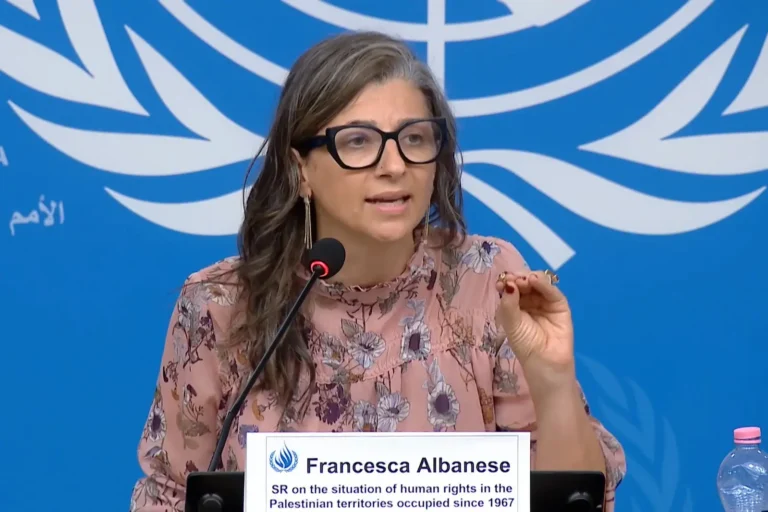172 trillions that’s how much wealth we are missing out on because of gender inequality in labour markets. If women earned the same as men over their lifetimes, the world could reap a significant ‘gender dividend’ the World Bank says.
The earnings gap is one part of a broader gender imbalance that has many causes and serious consequences for women’s wellbeing and for overall development progress. Lifting women out of poverty is critical to achieving Sustainable Development Goal (SDG) 5 on gender equality and has multiplier effects for all the 17 Goals.
That’s why UNDP is championing ‘Equanomics’, our flagship initiative to dismantle economic structures that generate and perpetuate gender inequality. Building expertise and supporting partners that want to transform their economies to work better for everyone, Equanomics envisions a new path and is helping countries take it.
“Human beings have equal rights, fundamental rights. And economics as a discipline must also give expression to that as a way of understanding where inequality prevails and, secondly, how to address it in policy terms.”
– Achim Steiner, UNDP Administrator
The most pervasive human rights violation
Gender-based discrimination is the most widespread violation of human rights, limiting choices for individuals and development prospects for nations and the whole world. And in many countries, conflict and crisis are threatening to reverse previous gains in gender equality.
Climate change could push 158.3 million more women and girls into poverty, while armed conflicts, disasters and other crises steer resources away from social safety nets that are crucial to help women and communities to stay afloat during tough times.
.jpg?auto=webp)
Women also shoulder a far greater burden of unpaid care and domestic work. An International Labour Organization report found that about 16.4 billion hours were spent on unpaid care work every day in the 64 countries studied. That’s like 2 billion people working a full eight-hour day – without pay. And more than three quarters of this work is performed by women. Through their uncompensated labour, women – and especially those facing compounding disadvantages – are propping up economies that are failing them in multiple ways.
“Mainstream economics does not recognize and value unpaid care and domestic work, which is mainly done by women and girls… This unpaid economy underpins the paid economy, and it is the unpaid economy that replenishes and renews the labour force on a day-to-day basis as well as inter-generationally. This unpaid economy is taken for granted in a lot of economic policy making.”
– Diane Elson, feminist economist and Equanomics Global Learning Lab contributor
Women still face lower pay and higher unemployment rates in formal sectors, while millions support their families in informal jobs, with little security. To make matters worse, many countries are choosing policies that make women poorer. Nearly 2.4 billion working-age women live in places that do not guarantee them the same rights as their male co-workers. A range of policies hinder women’s economic advancement, including:
- Inadequate social protections, like paid parental leave and affordable childcare, which prevents women from joining or staying in the workforce
- Higher tax rates for second earners in a household, who are often women
- Legal restrictions on which sectors women are permitted to join
In 2022, only 34 gender-related legal reforms were recorded across 18 countries—the lowest number since 2001, according to a World Bank report. It will take another 1,549 reforms to reach legal equality in the areas measured. At the current pace, a woman entering the workforce today most likely will retire before she gains the same rights as men.
To speed up progress, we need more women making policy. UNDP is scaling up work to ensure women have an equal place in shaping our economies. In Mongolia, where women are severely underrepresented in executive and decision-making positions, we initiated the Women’s Leadership Network, a grassroots organization with over 1,800 members supporting each other across political divides. By pulling together, they’ve succeeded in raising the quota for women candidates in parliamentary elections.
“Confronting the challenges in women’s leadership involves a comprehensive approach to change attitudes and perceptions across genders. Our goal through this Network is to address and dismantle not only the gender stereotypes imposed by men on women but also to encourage a shift in the attitudes of women themselves. We need to empower women and equip them with tools to pursue decision-making roles.”
– Battsetseg Batjargal, Coordinator, Women’s Leadership Network, Arkhangai province
Equanomics at work
If countries can choose policies that hold women back, they can also choose to change them. And many are doing so.
During the COVID-19 pandemic, governments introduced a variety of policies addressing the impacts on women in particular. From support to unpaid care workers, to institutionalizing flexible working arrangements, to investing in gender-based violence prevention and response, these measures show that solutions for a gender-equal world are not only possible, they exist.
FROM GLOBAL EMERGENCY TO GLOBAL EQUALITY
UNDP and UN Women joined forces to compile a series of practical solutions learned from the global response to COVID-19. In cataloguing these policies, a new picture emerges of how we can dismantle systems that sustain gender inequality – even in times of crisis.
.jpg?auto=webp)
Our research with UN Women highlights the influence governments can have in shifting systems – including the discriminatory social norms and gender-based biases that underpin gender inequality. For instance, labour market reforms helped change beliefs around the employment of women, and parental leave policies have shifted perceptions around childcare responsibilities. Some governments even showed how policies could advance gender equality while simultaneously driving progress on other development priorities: for example, investing in women farmers’ climate resilience, or powering care centres with clean energy.
UNDP is calling for more and faster economic reforms to lift women out of poverty, and we’re helping countries to take action. We’re prioritizing policy shifts and strengthening institutions to advance equality through a series of initiatives, including Equanomics. The Equanomics flagship emphasizes three interlinked avenues for action:
- Expanding care systems and services: to help increase economic security and bridge gaps for women, particularly female-headed households, informal workers, migrant workers and others who are persistently on the edges of national economies. In 2022, 16 countries expanded their national care systems and local services with support from UNDP.
- Developing gender-responsive policies: including reforming tax systems and financing equality, by integrating gender equality priorities throughout the budget process. The Gender Equality Seal for Public Institutions is working with ministries of finance and tax authorities in 30 countries and across 23 sectors, to recognize and support public institutions that are committed to gender equality and women’s empowerment.
- Generating data and evidence to influence policy: to build a stronger understanding of the discrimination embedded in current economies and policies, as well as the social biases and norms that are preventing progress. For example, the Gender Social Media Monitoring Tool monitors in real time existing hate speech and biases in social media platforms.
UNDP is also hosting a global dialogue on Public Finance and Tax for Gender Equality – bringing together representatives from Ministries of Finance and tax authorities, along with other experts – to create a series of recommendations which can help guide governments action.
It’s not just talk. Our new Equanomics Global Learning Lab on Gender Equal Economies is another potential gamechanger. A hub for knowledge, collaboration and action, the Lab is helping economists and development professionals rethink the future of work, equipping them with the knowledge to steer the structural shifts we need to reach gender equality.
UNDP INTEGRATES GENDER INTO ALL ASPECTS OF DEVELOPMENT PROGRAMMING. IN 2023, UNDP SUPPORT HAS MEANT:
71.5 million women gained essential services
SPOTLIGHT: JOSEFA
In Angola, community health workers like Josefa Pinheiro Segunda Jaime are driving progress against tuberculosis. Visiting patients in their homes, they provide information and treatment to underserved populations
.jpg?auto=webp)
5.4 million women in crisis settings accessed jobs
After the October 2023 earthquakes in western Afghanistan, single mother Tamana Akbari got a job in a women-led community kitchen, earning an income to support her family while feeding her community.
.jpg?auto=webp)
1.6 million women gained energy access in 37 countries, opening up livelihood opportunities
When a solar minigrid was installed in her remote village in Nepal, 21-year-old entrepreneur Jayasara Bhul opened a solar-powered computer centre, where she provides IT services and training to her community.
.jpg?auto=webp)
“UNDP has the capacity for big impact and to bring scale in any intervention… We have a unique potential to integrate gender equality at the core of policy reforms and programmes. The Learning Lab responds to this vision… This Lab recognizes that Feminist economists have paved the way, and they are envisioning today alternative economic models to the current exploitative one.”
– Raquel Lagunas, Director of Gender Equality, UNDP
No time to lose
At the current rate of progress, it is estimated that 8 percent of the global female population, about 342 million women and girls, will be living in extreme poverty in 2030, and it will take close to 300 years to achieve full gender equality.
Women, their communities and the world cannot afford to wait.
Equanomics is part of how UNDP is working with partners to reach two key goals by 2025:
- Help 100 million people escape multidimensional poverty.
- Promote over US$1 trillion of public spending and private capital investment in the SDGs.
As we approach the 2030 deadline for the SDGs, dismantling the structural barriers to gender equality is increasingly urgent. Closing gender gaps in the economy is prerequisite for achieving the Goals and creating a more prosperous future for everyone.




